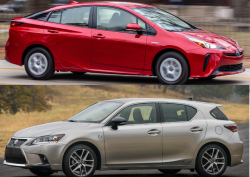
— A Toyota partial zero emissions vehicle (PZEV) class action lawsuit includes 2011-2017 Lexus CT 200h and 2007-2019 Toyota Prius vehicles.
According to the lawsuit, Toyota failed to properly identify and pay for all the vehicle parts and labor that should be covered under the California emissions warranty.
California plaintiff and 2015 Lexus CT 200h owner Jessica Foust filed the partial zero emissions lawsuit that includes:
"All persons who are, or have been, owners or lessees of model year 2011 through 2017 Lexus CT200h PZEV vehicles and model year 2007 through 2019 Toyota Prius PZEV vehicles, registered or operated in California, Connecticut, Delaware, Maine, Maryland, Massachusetts, New Jersey, Oregon, Pennsylvania, Rhode Island, Vermont, and Washington."
The plaintiff says Toyota has distributed partial zero emissions vehicles since 2010 and received zero emissions vehicle (ZEV) credits from the state of California.
The Toyota lawsuit alleges the automaker is required to extend the California emissions warranty on PZEVs to 15 years or 150,000 miles for all emission-related parts, and to 10 years or 150,000 miles for the hybrid battery.
Toyota has allegedly wrongfully limited the duration of coverage of the hybrid battery by failing to cover the hybrid battery for 10 years or 150,000 miles. The class action lawsuit alleges Toyota ignored regulations and covers the battery under warranty for only 8 years or 100,000 miles.
Toyota Class Action Lawsuit (Warranty Booklets)
The warranty books for the Prius and Lexus vehicles say the California emissions control warranty covers the hybrid systems which consists of the following components:
"Battery control module (battery voltage sensor); Hybrid battery; Hybrid Battery junction block (including system main relay); Hybrid control module (power management control module); Inverter with converter; and, Transaxle (including motor and generator)."
According to the Toyota class action, the warranty books "unlawfully and incorrectly" provide the hybrid battery “is covered under the Hybrid System Warranty for eight years or 100,000 miles, whichever occurs first.”
The affected states named in the lawsuit come from the warranty book for the California emissions warranty which applies to vehicles in states other than California.
“Connecticut, Delaware, Maine, Maryland, Massachusetts, New Jersey, Oregon, Pennsylvania, Rhode Island, Vermont, and Washington are the other states to which this [California Emission Control] warranty currently applies.”
The Toyota class action lawsuit alleges the automaker is able to reduce the amount of money it spends on warranty-related repairs of the hybrid batteries.
The plaintiff argues, "most if not all dealerships or consumers will not investigate or understand that the hybrid battery should correctly be covered for 10 years/150,000 miles under the California Emissions Warranty as required by the California Code of Regulations."
Lexus and Toyota owners are then allegedly forced to pay for repairs that should be covered under warranties.
According to the class action lawsuit, Toyota extended it's hybrid battery warranty in October 2019 for all new 2020 Lexus hybrid and Toyota hybrid, plug-in hybrid and fuel cell electric vehicles from 8 years/100,000 miles to 10 years/150,000 miles.
However, that did nothing for the 2011-2017 Lexus CT 200h and 2007-2019 Toyota Prius vehicles.
The Toyota class action lawsuit was filed in the U.S. District Court for the Central District of California, Western Division: Jessica Foust, v. Toyota Motor Corp., et al.
The plaintiff is represented by Pomerantz LLP.




